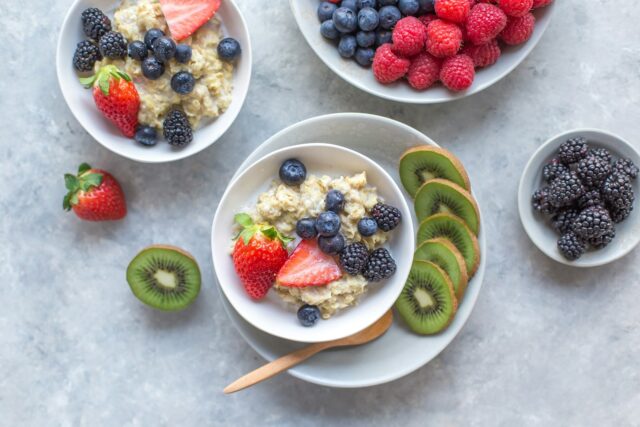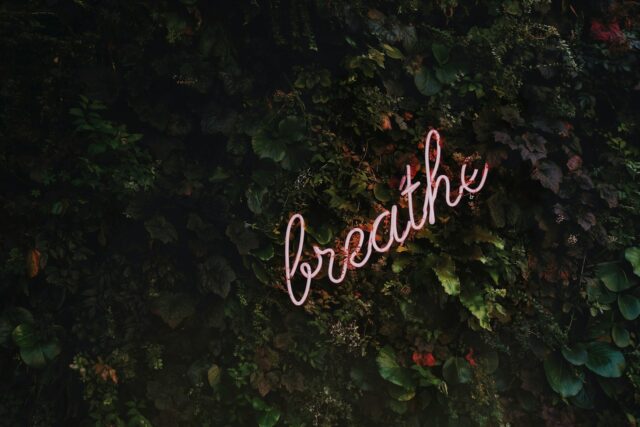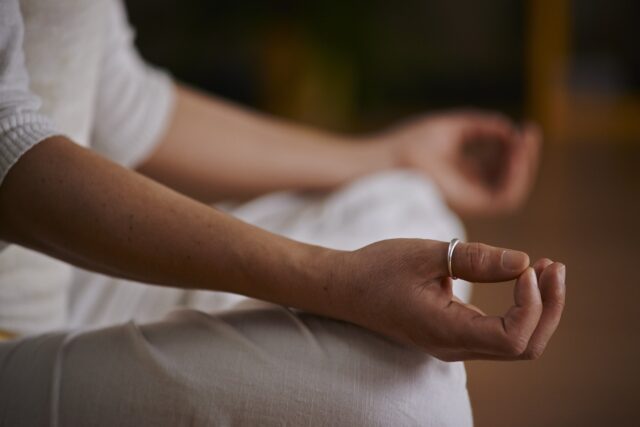Backed-by-science lifestyle modifications to support mental wellness without the overwhelm. Small shifts you can start today to feel better—mind, mood, and body!
Let’s be real—there is a lot to be stressed about these days, and it’s impacting our mental health! Whether it’s stress, burnout, depression, anxiety or just feeling off, more and more people are finding themselves overwhelmed and exhausted. And it’s not just in our heads (pun intended)—anxiety and depression are at an all-time high, and our nervous systems are crying for a little TLC.
Here’s the good news: there are simple, sustainable lifestyle changes that can seriously support your mental health. I’m talking about small shifts that feel doable, not another long to-do list that adds to the stress.
These are the same things I come back to again and again—not because they’re trendy, but because they actually work.

1. Nourish Your Brain with Food That Loves You Back
Let’s start with the thing I talk about all the time—nutrition.
Your brain is hungry, and what you feed it matters. Inflammation, blood sugar swings, and nutrient deficiencies can all mess with your mood and mental clarity. A diet rich in whole foods—especially anti-inflammatory ones—can help regulate your hormones, support neurotransmitter function, and reduce the foggy, anxious, blah feelings that come with poor mental health.
Read my in-depth article about nutrition and Mental Health here.
What to focus on:
- Omega-3s from wild salmon, walnuts, chia seeds, or a quality supplement
- Antioxidant-rich foods like berries, leafy greens, and colorful veggies
- Stable blood sugar: pair carbs with protein/fat to avoid crashes
- Fermented foods and fiber for gut health (your gut and brain are besties)
– Here is my favorite Omega 3 supplement
– Magnesium is essential, I love using a powder, but capsules work too!
– Daily greens powder for when life gets crazy

2. Meditation: For When Your Monkey Brain is in Hyperdrive
Meditation isn’t about becoming a zen monk (or even “clearing your mind”, it’s about creating a little breathing room between you and your thoughts. Even 5-10 minutes a day can help reduce anxiety, improve focus, and boost emotional resilience.
Meditation has been shown to literally rewire your brain. More calm, less chaos.
Easy ways to start:
- Use a guided app like Headspace or Calm
- Try a simple body scan or box breathing at bedtime
- Start with “just sit” — no expectations, no rules

3. Stress Management: Because Life’s Not Slowing Down
Stress isn’t going anywhere—but how you respond to it can change.
Chronic stress increases inflammation, drains your energy, messes with your sleep, and makes mental health symptoms worse. You can’t eliminate stress completely, but you can absolutely support your nervous system so it doesn’t stay in panic mode 24/7 and changes your response to that stress, which overall stress longterm.
Try this:
- Build in short breaks throughout the day
- Use tools like acupressure mats, essential oils (lavender is very calming) or weighted blankets
- Protect your peace—boundaries are a form of self-care
- Journalling so so benefitcial to help you sort through your thoughts.

4. Move Your Body (Make It Fun!)
Exercise is one of the best natural antidepressants we’ve got. It boosts endorphins, reduces inflammation, improves sleep, and makes you feel strong. But it doesn’t have to look like a 6-day-a-week HIIT program.
Movement ideas that help:
- Walks (bonus if they’re outdoors in nature) – The comfiest walking shoes ever
- Strength training (even 2x/week is game-changing) – I love having these adjustable weights and bands are great too!
- Yoga, barre, dance—whatever feels fun, not forced
- Try new things. YouTube has a variety of free options, and I love Peloton because the app gives you a wide variety of different works from Yoga to hit, and you don’t need to buy a bike; you can just use the app!

5. Prioritize Sleep Like It’s Your Job
Sleep isn’t just beauty rest—it’s brain reset. Poor sleep is deeply linked to depression and anxiety, and getting enough of it can literally shift your mood and improve cognitive function.
If you’ve been burning the candle at both ends, it’s time to put the phone down and prioritize your pillow.
Tips for better sleep:
- Wind down with a routine: bath, tea, stretch, journal
- Block blue light with these glasses
- Try magnesium glycinate or a sleep-support blend (always talk to your doc first)
- Make your bedroom a cave—cool, dark, quiet
- Try a sleep mask to make your room extra dark

6. Strengthen Your Real-Life Connections
We’re wired for connection—but in the age of DMs and group texts, it’s easy to feel lonelier than ever.
Research shows that social connection reduces risk of depression, boosts self-worth, and improves brain health. Don’t underestimate the power of coffee or walk with a friend and a real belly laugh.
Ways to connect:
- Join a group class (book club, yoga, crafting, whatever fits your vibe)
- Plan regular friend check-ins, even virtually. It’s ok to be the one to plan. Everyone gets buys and if it’s on your mind just reach out!
- Volunteer or be part of something that feels meaningful.

7. Take a Break From the Scroll Spiral
Screens = overstimulation + sleep disruption + stress triggers. If your screen time report makes you cringe, you’re not alone.
We’re not meant to be constantly plugged in. A little break can go a long way toward lowering anxiety and helping your brain breathe.
Tips for healthier screen time:
- Use screen limit apps
- Consider Keeping your phone out of the bedroom or at least avoid using it 30min before bed
- If you like me, read on your phone before falling asleep, use blue blocker glasses, and change your book app to dark screen mode
- Replace nighttime scrolling with a book or podcast
- Try a 24-hour social media break (you might actually like it, it’s really nice!)
Start Small—And Stay Consistent
Here’s the thing: these lifestyle changes for mental health don’t work overnight. But over time, they build a foundation that supports your mood, resilience, and overall well-being.
And the best part? These aren’t just for people with a diagnosis. These are human things—habits that support your brain, body, and spirit in a modern world that moves a little too fast.
If you’re feeling stuck, anxious, or low, start with one small shift or two. Maybe that’s a 10-minute walk. Or adding protein to your breakfast. Or texting a friend. Tiny changes can lead to big shifts over time.
You don’t need a total life makeover. You just need a little momentum.

My Favorite Tools for Mental Health Support
These are affiliate links, which means I may earn a small commission if you choose to purchase. It helps support the blog and lets me keep creating free, helpful content. Thank you for being here 💛
- 🧠 My go-to omega-3 supplement
- 🧘♀️ Calm Meditation App
- 🧘♀️ Headspace Meditation App
- 💪 Adjustable dumbbells for your home workout
- 🛏️ A Weighted blanket is so soothing, I love recommending to clients
- 😴 Sleep support with magnesium – Amazon
- 😴 Sleep support with magnesium – Thorne
- 😴 Sleep support with magnesium – Moon Juice
- 💻 Blue light blocking glasses
- 📚 Journaling is so powerful
- 🍓Vitamix blender for your mental health-supporting smoothie
- 🍓Beast Blender is so pretty on your counter and it makes it easy to take your healthy smoothie with you




